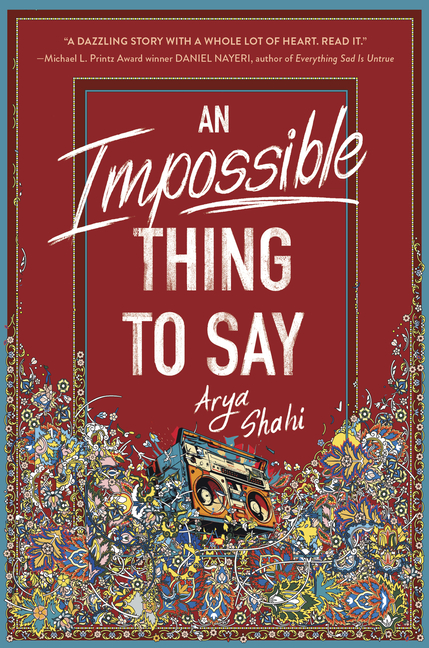
Book Resume
for An Impossible Thing to Say by Arya Shahi
Professional book information and credentials for An Impossible Thing to Say.
6 Professional Reviews (1 Starred)
3 Book Awards
Selected for 2 State/Province Lists
See full Book Resume
on TeachingBooks
Iranian American Omid lives with his family in Tucson, Arizona, in 2001. At the private ...read more
- School Library Journal:
- Grades 8 and up
- Booklist:
- Grades 9 - 12
- Publisher's Weekly:
- Ages 13 and up
- Kirkus:
- Ages 13 and up
- TeachingBooks:*
- Grades 7-12
- Cultural Experience:
- Asian American
- Immigrant / Refugee
- Middle Eastern
- Muslim
- Genre:
- Historical Fiction
- Poetry
- Year Published:
- 2023
5 Subject Headings
The following 5 subject headings were determined by the U.S. Library of Congress and the Book Industry Study Group (BISAC) to reveal themes from the content of this book (An Impossible Thing to Say).
6 Full Professional Reviews (1 Starred)
The following unabridged reviews are made available under license from their respective rights holders and publishers. Reviews may be used for educational purposes consistent with the fair use doctrine in your jurisdiction, and may not be reproduced or repurposed without permission from the rights holders.
Note: This section may include reviews for related titles (e.g., same author, series, or related edition).
From Cooperative Children's Book Center (CCBC)
Iranian American Omid lives with his family in Tucson, Arizona, in 2001. At the private high school he attends, Omid is shy and lacks confidence. But he hits it off with new student Emily (white) and the two convince each other to try out for the school play, A Midsummer Night’s Dream. Emily is cast as Titania and Omid is cast as Bottom, a role he’s excited to play even though he also wishes he got the role of Emily’s lover. Omid is also getting to know his grandparents, Maman Joon and Baba Joon, who’ve just emigrated from Iran. He feels challenged, in a good way—to speak more Farsi, to understand their lives, including the oppression they faced in Iran for their Baha’i faith. (Omid’s father came from a Muslim family, although he is no longer devout.) With the events of 9/11 and its aftermath playing out in the background, intense feelings begin to overwhelm Omid, especially after Baba Joon, who has shown signs of increasing unhappiness, disappears; and his crush on Emily leads to him punching Geoff, the senior with whom she’s paired in the play and spending a lot of time. But his best friend Sammy (Black) has introduced him to rap, and after listening to Sammy’s playlists on repeat, Omid begins writing his own raps, processing his thoughts and feelings through his unique brand of English/Farsi spoken word poetry. This novel in verse about finding your voice has realistically messy, marvelously realized characters. (Age 12 and older)
CCBC Choices 2024 © Cooperative Children's Book Center, Univ. of Wisconsin - Madison, 2024. Used with permission.
From School Library Journal
November 24, 2023
Gr 8 Up-Persian-American playwright and rapper Shahi's novel-in-verse explores themes of coming of age, cultural assimilation, and personal acceptance. In the homogeneity of Tucson, AZ, during the period leading up to and just after the terrorist attacks of 9/11, a multigenerational family impacted by the Iranian Revolution is trying to hold on to the threads of tradition, while finding their place in the community. Born to Muslim and Bah�'� parents, an illegal marriage in their home country, brothers Omid and Amir have grown up in an Americanized household, where Farsi was left in the past, but some aspects-Persian rugs, traditional cuisine, and a love of poetry-pervade. Omid's father, a rug dealer, weaves language like the threads of precious rugs, and younger brother Amir has inherited the gift of gab, always able to charm. Omid struggles to find his voice, despite his love of language and his achievements in AP English. When he meets Emily, a new girl at school, Omid seizes the opportunity to connect with someone he sees as a fellow outsider, and they dazzle in the theater auditions, as Omid's life plays out like a Shakespearean tragedy. Through the beloved bard, Omid discovers the strength of words and transforms himself into a poet-rapper, able to voice his fears about the confusing, conflicted, and dissonant world that surrounds him and find his footing in the family and at school. VERDICT Recommended for all collections serving teens, especially for fans of Daniel Nayeri's Everything Sad Is Untrue, Adib Khorram's Darius the Great Is Not Okay, Tahereh Mafi's A Very Large Expanse of Sea, and Elizabeth Acevedo's The Poet X.-Rebecca Jung
Copyright 2023 School Library Journal, LLC Used with permission.
From Horn Book
Starred review from November 1, 2023
In this verse novel set in 2001, tenth grader Omid Soltani isn't comfortable in his own skin. As the child of Iranian immigrants living in Arizona, he feels foreign at school (especially in the post-9/11 climate), but never Persian enough with his family. When his grandparents arrive from Iran and he meets them in person for the first time, he feels "frozen in Farsi" with his stilted fluency, isolated from the very people with whom he most wants a connection. He finds a welcome distraction in being cast as Bottom in the school's production of Shakespeare's A Midsummer Night's Dream, but gets the most laughs when he plays Bottom's lines in his father's accented English, mocking his own culture for a primarily white audience and underscoring why Shakespeare would create a comical, lovable character and "make him a monster" for entertainment. As Omid grows, he learns to find his voice in his own interpretation of Shakespeare and in rap music that uniquely expresses his experiences. Shahi's poetic form sometimes mirrors the subject matter (a music playlist, a theatrical dialogue, a rap flow); there are many underline-worthy lines of free verse. An unpredictable development in the conclusion may have readers reaching for a tissue (and a comforting playlist). This is a compelling coming-of-age story about finding your own voice and holding on to hope in the face of uncertainty and doubt. Julie Hakim Azzam
(Copyright 2023 by The Horn Book, Incorporated, Boston. All rights reserved.)
From Booklist
September 15, 2023
Grades 9-12 *Starred Review* When Omid's maternal grandparents emigrate from Iran to a new life in America, his grandfather gifts him a journal to catalog his thoughts. What follows constitutes the rest of the book: the inner thoughts of a teenage boy witnessing the tumult of teen life alongside the historical event that was the 9/11 terrorist attacks. Bravely, Shahi takes pains not to reduce Omid's story into a one-issue affair. Rather, he uses his formidable talents as a poet and performer to explore the panoply of Omid's experiences: about the girl he pines for, about the secrets his grandfather has kept from their family, about the stresses of being successful Americans pulling his parents apart, about the pains of knowing his community views him with suspicion. This may have made for a chaotic narrative, but the alternating sections of verse, prose, play format, and more always perfectly fit Omid's mindset. This is a unique and thoughtful coming-of-age story that masterfully takes advantage of its unconventional narrative to reveal the truths that we all--no matter what our age--are often unable to say out loud.
COPYRIGHT(2023) Booklist, ALL RIGHTS RESERVED.
From Publisher's Weekly
July 24, 2023
An Iranian American teenager discovers the power of the written word in Shahi’s emotionally vulnerable verse debut. In July 2001 Arizona, Omid awaits the arrival of Baba Joon and Maman Joon, his maternal grandparents who are emigrating from Iran to the U.S. and whom he’s never met. Upon their meeting, Baba Joon gives Omid a journal, hoping it may help Omid manage his tumultuous emotions. While finding the words for feelings surrounding his experiences navigating his identity, the Islamophobic bigotry he faces in the aftermath of 9/11, and his epic crush on a girl at his new prep school isn’t always easy, he discovers that writing in the journal helps him process. Inspired by a Shakespeare unit in his honors English class and the play he auditions for to get closer to his crush, Omid attempts to express himself using varying methods of writing that improve communication in everyday life. When his friend Sammy, who is Black, burns him a rap mix CD, the music unlocks a new medium through which Omid unearths his self-confidence. As Omid explores new facets of himself, his first-person narration develops into that of a self-assured protagonist whose voice leaps off the page; Shahi employs Shakespearean dialogue and original rap to kinetic effect. Ages 13–up.
From Kirkus
July 15, 2023
A tender coming-of-age story about an Iranian American boy getting to know his grandparents, learning more about Persian culture, facing prejudice, and growing in self-knowledge. It's July 2001, and Omid is a rising high school sophomore in Tucson, Arizona, when Baba Joon and Maman Joon, the maternal grandparents he's never met before, move to the U.S. from Iran. Baba Joon gives Omid a journal in which he begins to document his daily life: his crush on the new girl at his private prep school and the Shakespeare play he auditions for so he can be close to her, his experiences navigating two cultures, and the bigotry he hears about and faces in the aftermath of 9/11. Omid, whose father's family is Muslim and mother's family is Baha'i, tries on Shakespearean dialogue for size and reaches for words in Farsi as ways to better comprehend and express himself and his heritage, but what finally resonates most is the rap music his best friend introduces him to. Through rap, his self-awareness and confidence grow. Although slow to start, this novel in verse quickly becomes more engaging, and the first-person narration becomes more refined as the story progresses. This is a heartfelt and nuanced depiction of what it's like to straddle different cultures and the critical need to understand oneself. A love letter to words and their ability to not only define us, but shape who we are. (Verse fiction. 13-18)
COPYRIGHT(2023) Kirkus Reviews, ALL RIGHTS RESERVED.
3 Book Awards & Distinctions
An Impossible Thing to Say was recognized by committees of professional librarians and educators for the following book awards and distinctions.
2 Selections for State & Provincial Recommended Reading Lists
An Impossible Thing to Say was selected by educational and library professionals to be included on the following state/provincial reading lists.
United States Lists (2)
Primary Source Statement on Creating An Impossible Thing to Say
Arya Shahi on creating An Impossible Thing to Say:
This primary source recording with Arya Shahi was created to provide readers insights directly from the book's creator into the backstory and making of this book.
Listen to this recording on TeachingBooks
Citation: Shahi, Arya. "Meet-the-Author Recording | An Impossible Thing to Say." TeachingBooks, https://www.teachingbooks.net/bookResume/t/92467. Accessed 19 January, 2025.
Preview Digital Book
Explore An Impossible Thing to Say on Marketplace. Access requires OverDrive Marketplace login.
This Book Resume for An Impossible Thing to Say is compiled from TeachingBooks, a library of professional resources about children's and young adult books. This page may be shared for educational purposes and must include copyright information. Reviews are made available under license from their respective rights holders and publishers.
*Grade levels are determined by certified librarians utilizing editorial reviews and additional materials. Relevant age ranges vary depending on the learner, the setting, and the intended purpose of a book.
Retrieved from TeachingBooks on January 19, 2025. © 2001-2025 TeachingBooks.net, LLC. All rights reserved by rights holders.







 CCBC Choices, Selection, 2024
CCBC Choices, Selection, 2024
 Horn Book Fanfare, 2001-2024, Selection, 2023
Horn Book Fanfare, 2001-2024, Selection, 2023
 Junior Library Guild Selections, 2012-2024, Young Adult Selection, 2023
Junior Library Guild Selections, 2012-2024, Young Adult Selection, 2023
